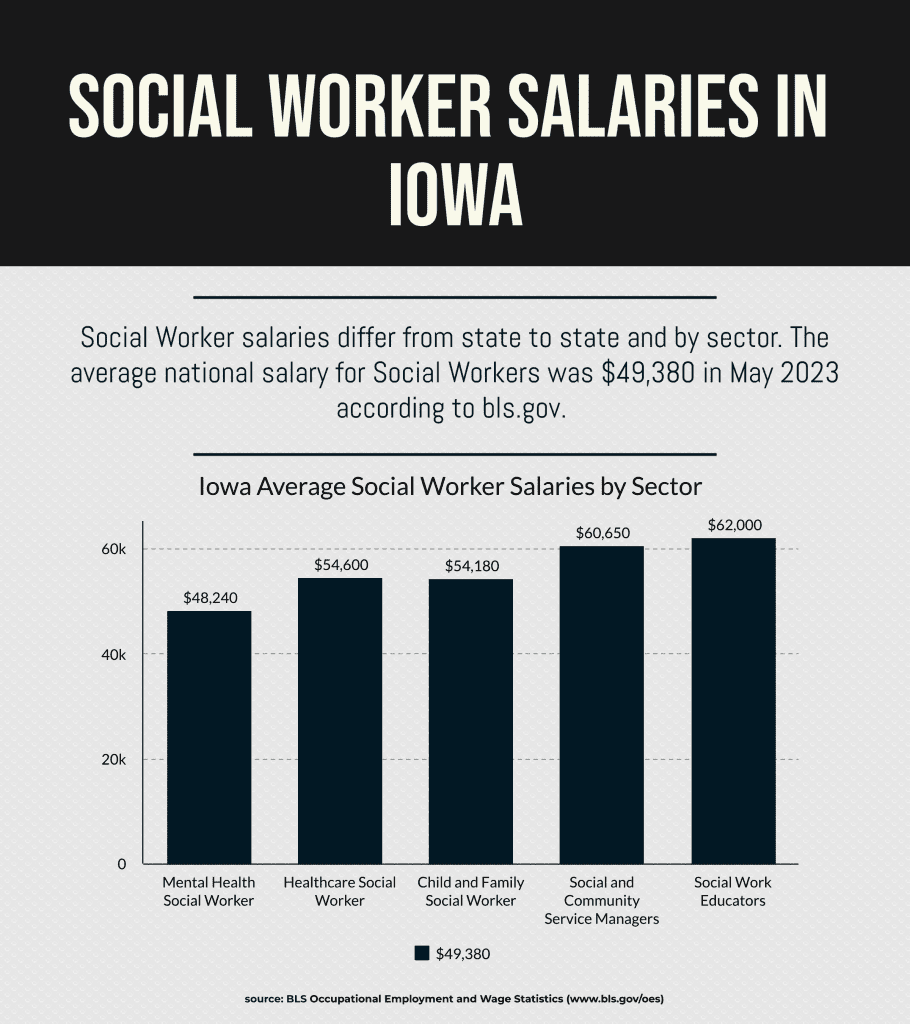
Learn how to become a licensed Social Worker in Iowa with information about education, state licensing, and also employment in Social Work in Iowa.
The midwestern state is known for its rich agricultural heritage, friendly communities, and also scenic landscapes. With a population of approximately 3.1 million people, it is considered a quintessential representation of the American heartland.
Why Become a Social Worker in Iowa?
Iowa’s economy heavily relies on agriculture, particularly in producing corn, soybeans, and pork. The state’s fertile soil, favorable climate, and strong work ethic made it an agricultural powerhouse. So its no wonder it has the nickname “The Corn State” or “The Hawkeye State.”
Also known for its natural beauty, it has rolling hills, prairies, and the picturesque Mississippi River along its eastern border. Outdoor recreational opportunities, such as hiking, fishing, hunting, and camping, make it a haven for nature enthusiasts.
Education is highly valued in Iowa, with a strong focus on providing quality schooling at all levels. The state consistently ranks highly in national education rankings and has numerous school districts renowned for their academic achievements.
Overall, Iowa offers a unique blend of natural beauty, agricultural importance, welcoming communities, and cultural treasures. Its distinct characteristics contribute to the state’s charm and appeal. Its a place where residents can experience a high quality of life and strong sense of community.
What are the Social Work Education Requirements in Iowa?
To be a social worker in Iowa, individuals must meet the education requirements set forth by the Iowa Board of Social Work. The specific educational pathway to become a social worker may vary depending on the level of licensure and specialization.
Bachelor’s Degree in Social Work (BSW)
A licensed bachelor’s social worker (LBSW) in Iowa requires a BSW from a program accredited by the Council on Social Work Education (CSWE). This degree typically requires four years of full-time study. Coursework includes social work theory, research methods, human behavior, policy, and also a field practicum experience.
Master’s Degree in Social Work (MSW)
To be a licensed master’s social worker (LMSW) or a licensed independent social worker (LISW) in Iowa, individuals must have a master’s degree in social work (MSW) from a CSWE-accredited program. The MSW program usually takes two years to complete. And it includes advanced coursework in social work theory, clinical practice, policy analysis, research, and also supervised field placements.
Doctorate Degree
Individuals interested in advanced research or teaching positions in social work may choose to pursue a doctoral degree in social work (DSW or PhD).
To become a Licensed Independent Social Worker (LISW) in Iowa, individuals must hold a master’s or doctoral degree in social work from a CSWE-accredited program. The program must include coursework in human behavior, social policy, research methods, and clinical practice. Additionally, candidates must complete a minimum of two years of post-graduate supervised clinical experience.
Iowa Board of Social Work
It is important to note that these are general education requirements, and specific requirements for licensure may vary depending on the level of licensure and specialization within social work. It is advisable to consult with the Iowa Board of Social Work or an accredited social work program in Iowa for the most up-to-date and detailed information on education requirements to become a social worker in the state. Also continuing education courses are mandatory.
What are the Social Work Licensing Requirements in Iowa?
The licensing requirements for social workers in Iowa are as follows:
1. Licensed Bachelor Social Worker (LBSW)
- Hold a Bachelor’s degree in social work (BSW) from a CSWE-accredited program.
- Pass the Association of Social Work Boards (ASWB) Bachelor’s Level Examination.
- License Renewal requires 27 hours of professional development in continuing education.
2. Licensed Master Social Worker (LMSW)
- Hold a Master’s degree in social work (MSW) from a CSWE-accredited program.
- Complete 4000 hours of supervised social work experience within a minimum of two years.
- Pass the ASWB Master’s Level Examination.
- License Renewal requires 27 hours of professional development in continuing education.
3. Licensed Independent Social Worker (LISW)
- Hold a Master’s or Doctoral degree in social work from a CSWE-accredited program.
- Complete 110 hours of supervised clinical social work experience.
- Pass the ASWB Clinical Level Examination.
- License Renewal requires 27 hours of professional development in continuing education.
In addition to the educational and experience requirements, applicants must also submit an application, pay the required fees, and pass a criminal background check. It is essential to contact the Iowa Board of Social Work for the most accurate and up-to-date information. You must also complete continuing education courses.
Can You Get A Social Work License by Endorsement In Iowa?
Yes, in Iowa, you can get a social work license by endorsement. The Iowa Board of Social Work allows individuals who hold a social work license from another state to apply for licensure by endorsement. To qualify for endorsement, you must meet the following criteria:
1. Hold a current and active social work license in good standing from another state.
2. Have completed the educational requirements for licensure in Iowa, which include a Bachelor’s or Master’s degree in social work from a CSWE-accredited program.
3. Have completed the appropriate supervised work experience requirements for the level of licensure you are seeking in Iowa.
4. Pass the relevant level of the ASWB examination for Iowa licensure (Bachelor’s Level Examination for LBSW, Master’s Level Examination for LMSW, or Clinical Level Examination for LISW).
5. Meet any additional requirements set forth by the Iowa Board of Social Work.
To apply for licensure by endorsement in Iowa, you will need to submit an application, supporting documentation, and any required fees to the Iowa Board of Social Work. You will also be required to complete continuing education for relevant professional development thru the Iowa department.
How Much Do Social Workers Make In Iowa?
The salary of a social worker in Iowa can vary based on factors such as experience, education level, specialization, and the specific setting of employment. For example a professional in public health social work may earn more than one in mental health social work. According to the data from the Bureau of Labor Statistics (BLS), the average annual wage for social workers in Iowa is ranges from $48,850 to $67,710.
| Iowa Social Work Career | Average Salary |
|---|---|
| Child, Family, and School Social Workers | $51,460 (BLS) |
| Healthcare Social Workers | $57,920 (BLS) |
| Mental Health and Substance Abuse Social Workers | $49,850 (BLS) |
| Social Workers, All Other | $67,710 (BLS) |
| Social Work Teachers Postsecondary | $66,790 (BLS) |

What’s It Like Working As A Social Worker In Iowa?
Working as a social worker in Iowa can be both rewarding and challenging. Iowa has a high demand for social workers due to the prevalence of social issues such as poverty, substance abuse, mental health, and child welfare.
Job opportunities for social workers in Iowa can be found in various settings, including government agencies, non-profit organizations, hospitals, school social worker, and private practices. Social workers in Iowa often work directly with individuals, families, and groups, providing counseling, case management, and advocacy services.
Iowa is known for its strong sense of community, and social workers play a crucial role in helping individuals navigate through social systems and access resources. They work closely with clients to develop treatment plans, connect them to community resources, and help them overcome challenges.
However, working as a social worker in Iowa also comes with its own set of challenges. The field can be emotionally demanding, as social workers often deal with individuals and families who are facing difficult situations. They may encounter resistance, trauma, and crisis situations, which can be emotionally draining.
Social Work Professional Associations in Iowa
- National Association of Social Workers, Iowa Chapter – NASW Iowa
- Iowa School Social Workers Association (ISSWA)
Your Social Work Career in Iowa
Overall, working as a social worker in Iowa requires a strong commitment to helping others and a deep understanding of the complexities of social issues. It can be a fulfilling and impactful career, but it also requires resilience, empathy, and a willingness to navigate through various challenges.
Additionally, social workers in Iowa face limitations in terms of funding and resources, which can impact their ability to provide comprehensive services. This can sometimes result in a heavy workload and limited time to address all the needs of their clients.
References:
- Bureau of Labor Statistics, Occupational Employment and Wage Statistics: https://www.bls.gov/oes/current/oes211021.htm#st
- Iowa Board of Social Work: https://hhs.iowa.gov/Licensure/Iowa-Board-of-Social-Work/Laws-and-Rules
Related:

